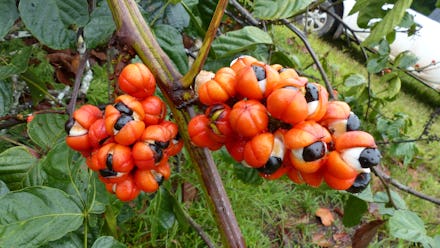What is guarana and does it really work better than coffee?

I get really intense cramps sometimes, but I hate to take painkillers since I don’t want to become dependent on them. When I started searching for an herbal alternative, guarana kept popping up. The name rang a bell, but I wasn’t sure why. A quick search informed me that it’s a natural upper with a lot of caffeine in it, but there was also a little buzz about its analgesic properties. Since I know that some natural treatments are more science-backed than others, I wondered, are there any proven health benefits of guarana?
The history and origins of guarana
Guarana is a climbing plant that grows in the Amazon. It produces a fruit that has a seed about the size of a coffee bean that sticks out in a way that makes it look like an adorably google-y eyed fruit, but its mythos is pretty dark. According to the Mawe (an indigenous people of Brazil) origin story, their people owe their existence to the plant.
In Mawe history, it is said that the original guarana plant sprouted from the eye of a murdered child. That plant grew more children, and from them came the Mawe people. People indigenous to the Amazon forests have been using the guarana plant for centuries, grinding the roasted seeds into a paste, which is used in breads and in a drink called capo, which was reputed to give hunters energy.
What it’s used for today
In contemporary times, the lush and sacred history of guarana has been marketed beyond recognition. If the name sounds familiar to you, it’s probably because guarana is one of the primary ingredients in many of the neon-canned energy drinks on the market today because of its high caffeine content. It comes in supplement pill and powder form, but is most commonly added to those aforementioned energy drinks. For context, a coffee bean contains about 2% caffeine by weight, but a guarana bean contains more like 4-6%. That’s at least double the amount of caffeine as coffee. No wonder hunters were into it.
Can guarana give you more energy?
“Guarana can help with weight loss, enhance athletic performance, and it can also reduce mental and physical fatigue.” says Giuseppe Aragona, a primary care physician and medical advisor at Prescription Doctor, a telemedicine practice. “It acts as a stimulant.” But, Aragona says, anyone who is sensitive to caffeine is probably going to experience side effects. He says that, at typical doses (which vary depending on the consumer’s age and health conditions), the caffeine in guarana can cause insomnia, nervousness and restlessness, stomach irritation, nausea, vomiting, increased heart rate and blood pressure and a host of other side effects. It’s important to note that even supplements marketed as totally natural can have some pretty strong reactions.
Guarana can indeed have basically the same effect as drinking coffee, then, but magnified because the caffeine content is more condensed. If you’ve ever had a Red Bull, you know the burst of energy that comes when you drink guarana — it comes on faster, lasts longer, and is a bit more intense than coffee. Guarana, then, in terms of benefit, is like coffee 2.0. Guarana does have some other potential health benefits, though, according to naturopaths, but these are still up for debate.
“Caffeine does not account for the plethora of other reported benefits [of guarana],” Michelle Sands, a Vermont-based doctor of naturopathic medicine, tells me. Sands says that caffeine is just one of three important compounds found in guarana, called methylxanthines. The other methylxanthines in guarana are theobromine and theophylline, which are also found in cacao. Studies suggest that methylxanthines are psychoactive substances that affect the nervous system by boosting energy and cognitive ability with few negative side effects.
Should you take guarana for pain?
The benefit of guarana is basically what you would expect of any stimulant: It makes you feel perky. But it’s used more for recreational than medicinal effect, and Aragona says that while he agrees that guarana could give a beneficial boost, he does not actually recommend it to patients. “I look to improve patients' wellbeing through adequate sleep, exercise and encouraging healthy eating habits,” he tells me. This isn’t really surprising, though. Most doctors won’t tell you that any stimulant is a good substitute for sleep, no matter how natural or beloved it is.
Unlike painkillers, guarana does not bind to the body’s opioid receptors, which is what produces their pain relieving and slightly euphoric effect, so it’s really not ideal for treating chronic pain. Still, guarana may help people in pain feel better because of its high caffeine content. Caffeine has been shown to help aid in pain management, but by itself won’t inhibit your body’s ability to feel pain. It’s usually used in combination with another substance, like aspirin or morphine, so there’s no reason to think that guarana alone will be an alternative to pain meds. Still, as any coffee drinker will tell you, caffeine is also a mood booster, so if you’re grouchy and sleepy for whatever reason — including pain — guarana may offer a higher octane substitute for espresso.